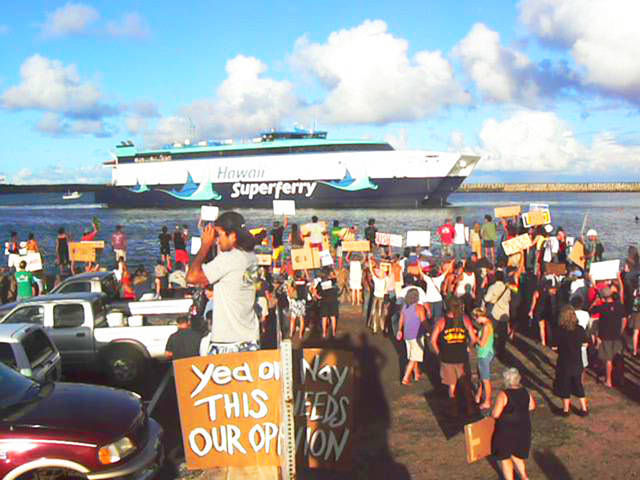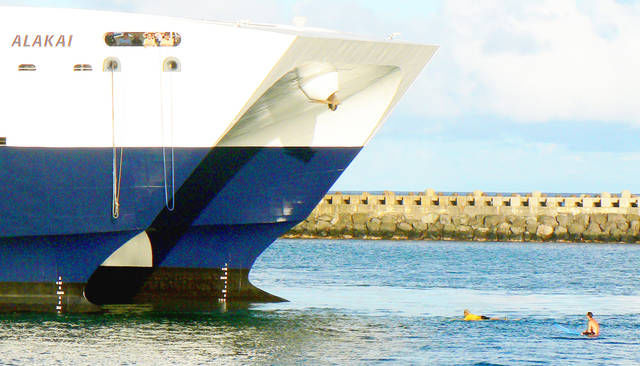Surfrider marks 10-year anniversary of Superferry being turned away
NAWILIWILI — A decade ago, Hawaii’s Superferry was turned back from Kauai.
That was the beginning of the end for the Superferry. The Kauai Chapter of Surfrider Foundation is remembering that 2007 campaign and historic confrontation with a party and panel discussion tonight at Nawiliwili Small Boat Harbor’s Nawiliwili Yacht Club.
Jonathan Jay said blocking the ferry was a life-changing experience.
“It showed me what happens when people come together in the community and act in unison with a single vision, clear values, and respect for the aina, all these things the kupuna keep telling us over and over,” said Jay, KKCR talk show host.
The 350-foot Superferry could carry almost 300 cars and more than 800 passengers between Oahu and Maui, and its operation lasted more than a year.
Kahului Harbor Coalition, along with The Sierra Club and co-plaintiffs Maui Tomorrow, pursued legal efforts to ensure the ferry complied with environmental laws three years prior to its attempt to commence service.
Judy Dalton, co-chair of the Kauai Group of the Hawaii Chapter Sierra Club, said, “Our main concern was protecting Hawaii’s unique environment. That is why we repeatedly used the courts to ensure compliance with Hawaii’s environmental-review laws.”
The huge, twin-hulled ship, capable of traveling at 45 knots, posed a hazard to calving grounds of humpback whales protected under the federal Endangered Species Act. The luxury ferry also did not propose a plan to prevent accidental importation of invasive species, such as coqui frogs inadvertently stowed away in passengers’ vehicles.
In August 2007, the Hawaii Supreme Court unanimously ruled that an environmental impact assessment was required to continue operations of the $85-million vessel.
“The state court ordered the Superferry not to sail to Maui because operations violated state environmental law,” said attorney Dan Hempey of the law firm De Costa Hempey. “Instead of complying with state law, the Superferry just turned and pointed straight to Kauai. Their legal maneuvering was so brazen.”
Hundreds of community activists and environmentalists arrived at Kauai’s Nawiliwili Harbor to protest the ferry’s maiden voyage from Honolulu on Aug. 26, 2007, blocking the delivery of nearly 500 passengers and sending them back to Oahu.
The incident received national attention and confirmed Kauai’s reputation as being fiercely independent and determined to protect its resources.
When it arrived at Nawiliwili again the next day, twice as many protesters lined the pier and nearly a hundred activists entered the water on surfboards and canoes to create a blockade that prevented the boat from docking after several hours.
“So many people came together from the Kingdom of Atooi, community groups and organizations to kids, surfers and everybody of all different colors, a rainbow of people,” Jay said. “Out on the water, us on our boards, we represented a static force, completely passive but immobile, blocking the channel.”
Many protesters were concerned the car ferry would drastically impact island traffic with hundreds of vehicles arriving on a daily basis, creating massive traffic jams to already over-burdened highways and local infrastructure.
“The whole island was at the harbor, and we were a mile up the road in our offices writing day and night trying to get injunctions,” Hempey said. “We just took this case because it was the right thing to do. We went to court and filed against the ferry. It seemed like we were against a small army of lawyers, but I felt like I was on the right side. I added a claim that it violated the state Constitution and the judge wouldn’t throw the claim out…. We survived the motion to dismiss and that’s the day the ferry people said they’re not going to sail to Kauai.”
The Superferry discontinued on March 19, 2009, and can no longer offer service in Hawaii due to the Hawaii Supreme Court ruling.
“It was impressive to witness the power of the people coming together in support of the court order out of Maui and making a very clear statement about the importance of environmental law,” Hempey said. “Superferry showed that the people of Kauai really care about their environment…. It truly was the power of the people that stopped the Superferry; it was very democratic.”
Sandra Herndon said through the People for the Preservation of Kauai, a petition was circulated that received over 6,000 signatures requesting an EIS be done by the state.
She said Rich Hoeppner spearheaded a movement to educate the community in the potential dangers and possible outcomes of the Superferry’s impact. This resulted in many citizens taking to surfboards and canoes, lining the pier to register their concern, she said.
“I am very proud of the work we did, as a community, in exercising our rights as citizens to have a definitive role in the protection of the life of our island,” she said.
Not everyone was happy about it.
Some have argued the Superferry would have given Kauai another option for interisland travel instead of relying entirely on the airline industry and paying what they believe are high fares. Other have said a ferry system is needed and would be welcome today as a less expensive way for families to travel to Oahu.
“We need competition and we don’t have it,” wrote Ray Domingo of Hanamaulu in a letter to The Garden Island.
In 2016, the state Department of Transportation conducted a feasibility study to reestablish a ferry system.
“It was 10 years ago and lots of people don’t know why we opposed the Superferry,” said Gordon LaBedz, vice-chair of the Surfrider Foundation. “When you first hear about the concept of a car ferry between the islands that’s going to compete with the airlines, your first reaction is it’s a great idea.”
“It’s only afterwards when we thought about the environmental impacts that we realized there are a number of reasons why it wasn’t a good idea,” he continued.
Rallies, hearings, petitions, lobbying, direct action and lawsuits were all part of the process. Mehana Vaughan, an assistant professor for natural resources and environmental management at the University of Hawaii, channeled a greater force. The Hawaiian language immersion educator used what she learned from the ancient Hawaiian culture by teaching chants during her protest in the water.
LaBedz said they were out in the water four hours.
“When it got dark, the darkness protected us, but we couldn’t see where each other were,” he said. “So we started chanting in the water. Mehana taught the chant to us as we went along. That was so powerful and so reaffirming. We knew exactly where we were in the water, and in the spirit of our voices you could hear the confidence and the grounding. It’s ancient wisdom that was able to help us persevere in the water.
“The call and response back and forth from the channel to the pier was so powerful,” he added. “It was an amazing thing. I’m a different person today because of it, and a better man.”
Ray Catania, volunteer organizer for Kauai Alliance for Peace & Social Justice, said all the other points raised about increasing auto traffic, putting sea mammals in harm’s way, putting added pressure on the island’s limited fishing and shoreline resources and the carrying of invasive species between islands were important.
“But the potential of using the Superferry for the purposes of war and U.S. military aggression in the Pacific, especially in the transport of Styker Brigade tanks, was of utmost concern to us, and not in the interest of peace environmental protection,” he said.
A free celebration at Nawiliwili Yacht Club of the 10th anniversary of the turning back of the Superferry is set for 6 p.m. tonight. It will include a Kauai EcoRoundtable designed to teach young activists how to wage an effective environmental campaign.
The event will feature a panel of veterans who will share their experiences, including Kalasara Setaysha with People for the Preservation of Kauai and chair of whale conservation group Kohola Leo, which means “Whale’s Voice.” Other panel experts will include LaBedz and KKCR talk show host Jimmy Trujillo.
After the panel discussion, pupus and wine will be provided by the Surfrider Foundation with live music by Burning Bush and Malama Pono All Stars.



